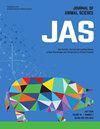PSVII-25 Undergraduate students’ knowledge and perception of welfare and ethical issues in animal agriculture.
IF 2.9
2区 农林科学
Q1 AGRICULTURE, DAIRY & ANIMAL SCIENCE
引用次数: 0
Abstract
Animal welfare and ethics are emerging issues influencing production practices, societal focus and legislation in animal agriculture. The objective of this work was to investigate the knowledge and perceptions of undergraduate students on animal welfare and ethical issues in production systems. An anonymous survey was developed with Qualtrics using a 5-point Likert scale: (1) strongly disagree, (2) disagree, (3) neutral, (4) agree, and (5) strongly agree. The survey was administered to 80 undergraduate students majoring in agriculture, and data were analyzed using descriptive statistics. A total of 53 participants completed the survey (response rate =66.25%), and they were mostly between the ages of 19 and 24 (81%), and females (52%). Students’ prior experiences with animals varied with those that had owned pets/companion animals (45%), grew up on livestock farms (24%), had ample experience with livestock (16%), to those that had little or no farm/animal experience (10%). About 52% strongly agreed that animal welfare was important in farm animal production, whereas 30% disagreed that human interests (e.g., profit, food production) should be prioritized over the welfare of farm animals. Majority of the students supported the use of animal welfare certifications (51%), but disagreed (55%) to the statement that animals should not be used for food production because the animal cannot consent to sharing of milk or eggs or to be slaughtered. About 44% of the students agreed that they were aware of animal welfare controversies related to factory farming, whereas 52% of the students were not familiar with the five freedoms of animal welfare. Some issues considered critical in farm animal welfare were animal confinement (60%); slaughterhouse practices (55%); use of antibiotics and hormones (53%); physical alterations (47%); transportation conditions of farm animals (43%); using animals for research (38%), continuous breeding for productivity (23%), among others. Half of the respondents (50%) agreed that the animal industry should implement effective practices and programs to assess animal welfare at farms and factories, and most students either agreed (43%) or strongly agreed (24%) that it was possible to balance the ethical treatment of animals with the need for food security in growing global populations. Students agreed (42%) that consumers had the right to know how farm animals were treated through labeling on animal products, and 43% strongly agreed that educational programs were essential in improving public knowledge and action on animal welfare. This study revealed important outcomes on the extent of students’ knowledge and perspectives on animal welfare and ethics, given their crucial role as consumers and future professionals in the animal industry. Therefore, the inclusion of animal welfare and ethics education into the agricultural curriculum is critical in expanding the formal education of undergraduate students and the training of future professionals.PSVII-25本科生对动物农业福利与伦理问题的认识与感知。
动物福利和伦理是影响动物农业生产实践、社会焦点和立法的新问题。这项工作的目的是调查本科生对生产系统中动物福利和伦理问题的认识和看法。使用5点李克特量表开发了一项匿名调查:(1)非常不同意,(2)不同意,(3)中立,(4)同意,(5)非常同意。调查对象为80名农学专业本科生,采用描述性统计方法对数据进行分析。共53人完成调查,回复率为66.25%,年龄以19 - 24岁为主(81%),女性占52%。学生对动物的先前经验各不相同,有养过宠物/伴侣动物(45%),在牲畜农场长大(24%),有丰富的牲畜经验(16%),有很少或没有农场/动物经验(10%)的学生。大约52%的人强烈同意动物福利在农场动物生产中很重要,而30%的人不同意人类利益(如利润、食品生产)应该优先于农场动物的福利。大多数学生支持使用动物福利认证(51%),但不同意动物不应用于食品生产的说法(55%),因为动物不能同意分享牛奶或鸡蛋或被屠宰。约44%的学生表示他们知道工厂化养殖引起的动物福利争议,而52%的学生不熟悉动物福利的五大自由。一些被认为对农场动物福利至关重要的问题是动物禁闭(60%);屠宰场操作(55%);使用抗生素和激素(53%);身体改变(47%);农场动物运输条件(43%);利用动物进行研究(38%),持续繁殖以提高生产力(23%)等。一半的受访者(50%)同意动物行业应该实施有效的实践和计划,以评估农场和工厂的动物福利,大多数学生要么同意(43%),要么强烈同意(24%),在全球人口不断增长的情况下,平衡动物的道德待遇与粮食安全的需求是可能的。42%的学生同意消费者有权通过动物产品上的标签了解农场动物是如何被对待的,43%的学生强烈同意教育项目对于提高公众对动物福利的认识和行动至关重要。考虑到学生作为消费者和未来的动物行业专业人士的重要角色,这项研究揭示了学生对动物福利和道德的知识和观点程度的重要结果。因此,将动物福利和伦理教育纳入农业课程,对于扩大本科学生的正规教育和培养未来的专业人员至关重要。
本文章由计算机程序翻译,如有差异,请以英文原文为准。
求助全文
约1分钟内获得全文
求助全文
来源期刊

Journal of animal science
农林科学-奶制品与动物科学
CiteScore
4.80
自引率
12.10%
发文量
1589
审稿时长
3 months
期刊介绍:
The Journal of Animal Science (JAS) is the premier journal for animal science and serves as the leading source of new knowledge and perspective in this area. JAS publishes more than 500 fully reviewed research articles, invited reviews, technical notes, and letters to the editor each year.
Articles published in JAS encompass a broad range of research topics in animal production and fundamental aspects of genetics, nutrition, physiology, and preparation and utilization of animal products. Articles typically report research with beef cattle, companion animals, goats, horses, pigs, and sheep; however, studies involving other farm animals, aquatic and wildlife species, and laboratory animal species that address fundamental questions related to livestock and companion animal biology will be considered for publication.
 求助内容:
求助内容: 应助结果提醒方式:
应助结果提醒方式:


